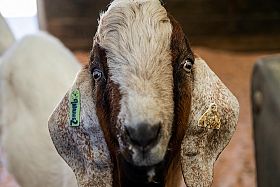Livestock surrogates successfully made fertile

Male pigs, goats and mice can produce sperm containing only genetic material from donor species, a study has shown.
In the study, animals that were made sterile through gene-editing techniques became fertile again after receiving stem cells from donor animals that were genetically different from them.
The novel surrogacy approach could speed the spread of desirable characteristics in livestock and improve food production for a growing global population.
It could also enable breeders in remote regions better access to genetic material of elite animals from other parts of the world, and allow more precision breeding in animals such as goats where using artificial insemination is difficult.
Furthermore it could be used as a tool for biomedical research and preservation of endangered species.
Donor-derived sperm
A key aspect for the technique to work is that surrogates must lack their own sperm but are otherwise physiologically normal.
The animal embryos in the study were therefore sterilised by using the gene-editing technique CRISPR to disable a gene that is essential for male fertility, called NANOS2.
After being born sterile, animals received stem cells from male donors into their testes – pigs received cells from wild boars, and mice and goats were given cells from different mice and goat species.
The animals were then able to produce sperm holding only genetic material from the donors through the novel surrogacy technique.
Sperm produced by the animals was normal and healthy, and mice were able to mate naturally and produce offspring.
The study also shows for the first time that it is possible to sterilise cattle by using genome editing on the NANOS2 gene.
Food security
“Our study provides a powerful proof of concept. This shows the world that this technology is real and can be used. Our findings could be used as a way to widely spread desirable genetic traits in livestock for generating milk, meat or fibre for human consumption. We now have to go in and work out how best to use it productively to help feed our growing population.”
-Professor Bruce Whitelaw, Genus Personal Chair of Animal Biotechnology, Roslin Institute.
“Genetic improvement of livestock, implemented through application of advanced breeding technologies such as artificial insemination, has been hugely successful in advanced economies. In our study we used gene editing technology to develop male surrogates that do not produce their own sperm, but can act as incubators for the sperm of other males. This development has potential application for genetic improvement of livestock in low- and middle-income countries, such as those with whom the Centre for Tropical Livestock Genetics and Health works, where small-holder livestock holdings are crucial for food security, nutrition and income generation.”
-Dr Simon Lillico, Research Fellow at the Roslin Institute
“With this technology, we can get better dissemination of desirable traits and improve the efficiency of food production. This can have a major impact on addressing food insecurity around the world. If we can tackle this genetically, then that means less water, less feed and fewer antibiotics we have to put into the animals.”
-Professor Jon Oatley, Reproductive Biologist, Washington State University’s College of Veterinary Medicine
The study, published in Proceedings of the National Academy of Science, was a collaboration between the Roslin Institute, Washington State University, University of Maryland and Utah State University.

This is exactly what i was looking for, thank you so much for these tutorials
It would be great to try this theme for my businesses
What a nice article. It keeps me reading more and more!